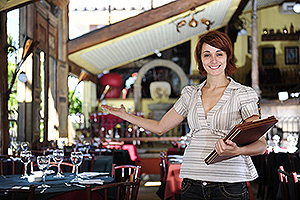
|
How To Hire a Restaurant Consultant
by Ron Gorodesky and Ed McCarron
Mr. Restaurant Owner: Got a second?
Ms. General Manager: Sure, what's going on?
Owner: Food and labor costs are going through the roof and my
loan we got in '01 is ballooning in three months. We need to get
a control on costs and need to refinance now. The restaurant financing
market is horrible. What should we do?
GM: I have some ideas about controlling costs, but really don't
have the time to implement them since I am really busy managing
the day-to-day activities. As for refinancing, I wish I knew.
That is really outside my experience.
Owner: That makes two of us! Maybe we need to bring in a consultant.
 Free Newsletter - Restaurant Marketing, Operations, Service & People Tips... Free Newsletter - Restaurant Marketing, Operations, Service & People Tips...
One can't miss article in each issue!
Sign-up for free and get the very next issue...
At some point in their restaurant lives, most restaurant owners
will either retain a consultant or work with one on a project.
Consultants sell time, experience, credibility and the ability
to find information. They can advise you on a variety of issues
including concept development, interior design, development assistance,
financial information systems and real estate. Their product,
or deliverable, can take the form of a written report or a hands-on
approach.
The term restaurant consultant is a broad definition encompassing
a wide variety of disciplines and areas of expertise. In our firm
alone we have experts in real estate, design, litigation, accounting
and operations. While the types of consultants can vary widely,
the selection process and client/consultant relationship are similar.
Here is a primer to help you make more profitable use of a consultant.
HOW DO YOU SELECT A RESTAURANT CONSULTANT?
Once you have determined you need
a consultant, begin the search process. Here are the basic steps.
- Begin a preliminary search. The goal of this
step is to locate different consultants who appear to be qualified
to assess the problem. Similar to receiving quotes on products,
it is better to identify more than one consultant. A great source
is a referral from your business colleagues. Find out who they
have used in similar situations and if they were happy with the
consultant's performance.
- Discuss the project with the finalists. Discuss the project
with the winners of your preliminary search. The goal is to narrow
the list down. If you only have two or three finalists, go to
step 3.
- Ask for written proposals. Ask for a written proposal, company
brochures, references and other collateral from the top candidates.
- Analyze the proposals. Look at each proposal carefully; if
you have any questions, ask the consultant to explain them. Check
references, also.
- Select the best consultant. Based on your analysis, pick the
most qualified consultant to perform the project.
WHAT SHOULD THE WRITTEN PROPOSAL SAY?
A well written proposal typically includes the following:
- Background information: this should include the issues involved
based on your discussions with the consultant. The approach to the project including the deliverable, whether it is a report or hands-on assistance.
- Information needed by the consultant from you to perform the project,
usually in list form.
- An outline of anticipated project completion dates.
- A discussion of fees, expenses and payment schedules.
WHAT SHOULD THE WRITTEN PROPOSAL TELL YOU?
- Does the consultant clearly understand the assignment?
- What control do you have over the professional fees charged?
- Are all items discussed presented in the proposal?
Keep in mind that "good proposals make good consultants"
- Make sure you are comfortable with the proposal before you sign it and return it to the consultant. This will help mitigate future misunderstanding during the course of the project.
HOW DO RESTAURANT CONSULTANTS GET PAID?
There are many ways you can pay an outside consultant.
When hiring a restaurant consultant, select the fee structure which enables the consultant to produce the best results at the lowest price. However, do not hire consultants solely based on cost. Being "penny wise and pound foolish" will lead you to "getting what you paid for". For any case, a consultant will figure his/her fee based on anticipated hours necessary to complete the project and hourly rates.
One method of paying a consultant's fee is to asked for fixed
fee. Ask the consultant to include in his proposal his estimated amount of time it will take to complete the project in hours and his
hourly rates. For example, some firms will charge a flat fee for an
operational analysis, like we at RAS do.
Another method is to be quoted a fee on a time at standard
basis, if it is unclear as to the scope and time length of the
project.
Typically, out-of-pocket and travel expenses are billed separately
from professional fees and this should be indicated in the proposal. These expenses are for such items as transportation
costs, lodging and meals and report production.
HOW TO LIMIT A CONSULTANT'S TIME
Keep in mind you are paying for the restaurant consultant's time. As a
result, try not to waste his time by withholding information
necessary to complete the project. A client who helps the
consultant use his time wisely usually ends up with a superior
work product at a lower price and in less time.
Restaurant Advisory Services provides full-service consulting
services to the restaurant and hospitality industries. The firm offers a full menu of advisory services focusing on every aspect of the life cycle of restaurants and other hospitality organizations, from pre-opening and conceptual planning, to day-to-day operations, to design and brokerage.
Copyright © 1997-2023 Restaurant Report LLC. All rights reserved.
|
Sign-up now for the leading e-mail newsletter dedicated to the restaurant owner and the independent restaurant community.
|
|